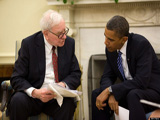Bugles Blown For Class Warfare As Buffet Rule Faces Senate
Post Views 1
Calling it an unjust tax code, the Senate will take up the proposed ‘Buffet rule’, a minimum tax for the wealthiest Americans. Obama feels that the rich do not need tax loopholes and can afford to pay more.
The tax will impose a higher rate on rich Americans whose income is from investments rather than salaries and wages. The tax would “phase in a minimum tax for those with incomes of $ 1 million or more, until those making at least $ 2 million would face a mandatory minimum of 30 percent tax.”
President Obama is very keen to ensure that the vote goes through as he feels that it will address mounting concerns over the growing income gap.
However, not everyone in his own party agrees with the proposed tax and garnering the 60 votes for it to advance in the Senate, seems like an uphill task.
A similar proposal in the Republican-controlled house has been defeated many times before and this time too, could follow the same course. In the Budget Committee, a stand-alone Buffet tax was defeated by 22-15 votes, with even a Democrat voting against it.
Treasury Secretary Timothy F. Geithner said, “Just because Republicans oppose this does not mean it’s not the right thing to do and not the right thing to push for.”
The GOP has argued that the tax will punish small businesses and will not create jobs. Senator John Thune, South Dakota Republican said, “ Instead of delivering political speeches promoting the destructive Buffet tax increase, President Obama should be encouraging his Democrat colleagues in the Senate to work with congressional Republicans on legislation that would actually create jobs, lower gas prices and rein in federal government spending.”
Both the Republicans and the Democrats have contrasting opinions. Republicans believe that keeping tax rates low on investments promotes more investment and savings. However, Democrats say that there is little proof of that and point to the Bush years, where the low rates show little benefit.
In his weekly radio address President Obama said, “In 2001 and 2003, the wealthiest Americans received two huge new tax cuts. We were told these tax cuts would lead to faster job growth. Instead, we got the slowest job growth in half a century and the typical American family actually saw its income fall.”
Small business backers say that the proposal would hurt small businesses. Kristie Arslan, President of the National Association for the Self-Employed said, “We’re much more interested in tax laws that impact the 22 million self-employed Americans who aren’t household names but who create a whole lot more jobs than Mr. Buffet.”
There is little doubt that both Obama and Mitt Romney will talk a lot about their respective tax-blueprints during the campaign, leading to the November elections. Both will claim that their blueprint is the perfect antidote for the struggling economy.
Obama’s blueprint is to raise taxes on the wealthy and boost levies on US companies that do business overseas and on the oil and gas industry. The revenue generated, he believes, “will help lower individual and corporate rates and reduce federal deficits.”
Romney on the other hand, would continue with all the Bush tax cuts, including those for the wealthiest people, while ‘trimming rates and eliminating estate taxes.’
Republican consultant Mike McKenna said, “If this were a heavyweight fight, we’re still in the first round where both sides are kind of feeling each other out.”
The Joint Committee on Taxation said that under existing laws, the proposal would produce $47 billion more in revenue over the next decade – less than 1 percent of the additional deficits Mr. Obama’s budget would deliver during that time.
The President and his wife Michelle on a gross income of $789,674 in 2011 paid just over 20% in Federal taxes. The President’s secretary Anita Decker Breckenridge, paid a “slightly higher “tax rate on earnings of $95,000.
That, said spokeswoman Amy Brundage, “is exactly why we need to reform our tax code and ask the wealthiest to pay their fair share.”
Bugles Blown For Class Warfare As Buffet Rule Faces Senate by Harrison Barnes


 The Economy Under a Trump Presidency
The Economy Under a Trump Presidency